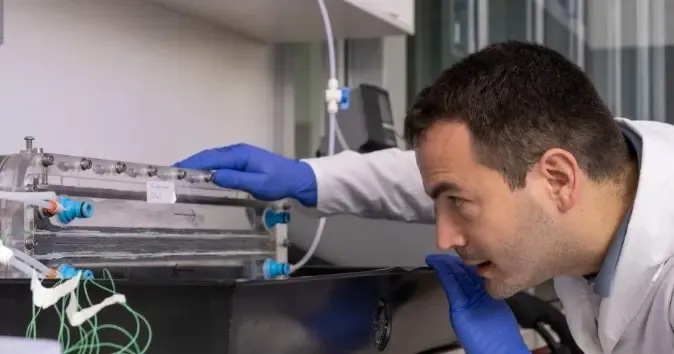Can Australian Scientists Enhance Vinegar's Antibacterial Properties with Nanoparticles?

Synopsis
Key Takeaways
- Microscopic particles enhance vinegar's antibacterial effects.
- Research addresses antibiotic resistance.
- Nanoparticles are effective against drug-resistant bacteria.
- The mixture is non-toxic to human cells.
- Findings published in ACS Nano.
Sydney, Sep 23 (NationPress) Microscopic particles have been added to vinegar to significantly boost its effectiveness against harmful bacterial infections, potentially aiding in the fight against antibiotic resistance, as revealed by groundbreaking research conducted by scientists from the QIMR Berghofer Medical Research Institute, Flinders University in Australia, and the University of Bergen in Norway.
The study indicates that antimicrobial nanoparticles composed of carbon and cobalt can amplify the natural infection-fighting properties of acetic acid, commonly referred to as vinegar, according to a press release from the QIMR Berghofer Medical Research Institute.
Historically, vinegar has served as a disinfectant for centuries; however, it is only effective against a limited range of bacteria and falls short against the most lethal strains, as reported by Xinhua news agency.
Researchers discovered that the antimicrobial nanoparticles could effectively kill multiple hazardous bacterial species, with their efficacy increased when combined with a diluted vinegar solution. The findings have been published in the esteemed journal ACS Nano.
In their research, scientists incorporated cobalt-infused carbon quantum dot nanoparticles into diluted acetic acid, forming a powerful antimicrobial solution. This mixture was tested against various pathogenic organisms, including the drug-resistant Staphylococcus aureus, Escherichia coli (E. coli), and Enterococcus faecalis.
According to molecular biologist Adam Truskewycz, a co-author of the study, the acidic environment of vinegar causes bacterial cells to swell and absorb the nanoparticle treatment. “Once exposed, the nanoparticles seem to attack dangerous bacteria from both the inside and the surface, leading to their rupture,” Truskewycz explained. He added that this method was non-toxic to human cells and successfully eliminated bacterial infections in mice wounds without hindering the healing process.
The enhanced antibacterial properties of vinegar identified in this research could play a crucial role in addressing the escalating levels of antimicrobial resistance worldwide, which is linked to an estimated 4.5 million deaths from infectious diseases, as noted in the statement.









